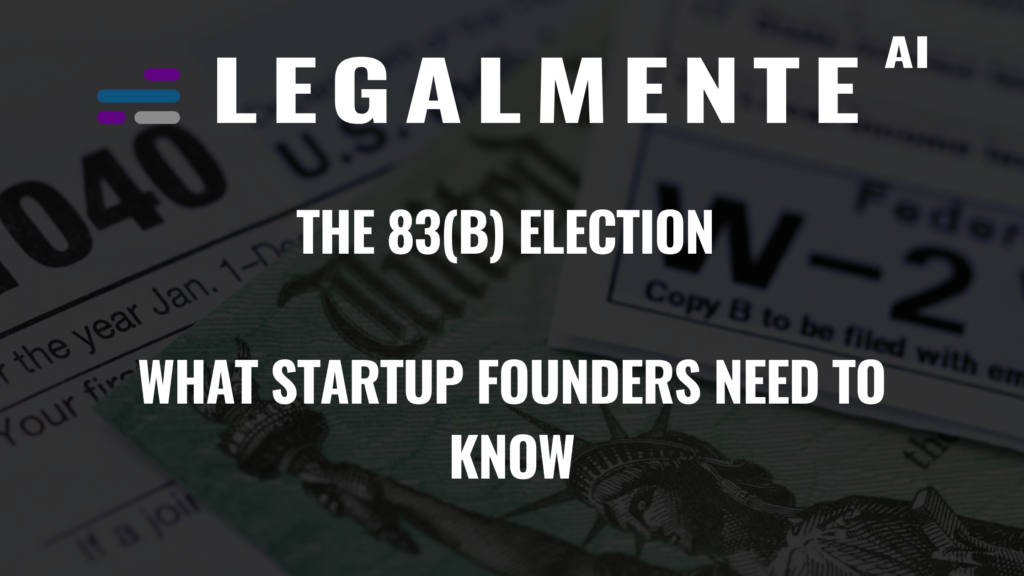There’s a critical choice founders must make when making a Section 83(b) election.
The 83(b) election is a provision under the Internal Revenue Code that gives an employee or startup founder the option to pay taxes on the total fair market value of restricted stock at the time of granting.
If one waits too long to decide, founders or employees granted company stock could face some profound tax implications.
Let’s start with the basics.
What is Restricted Stock?
While many startup companies give stock options to employees, some grant restricted stock to its founders and certain employees. Restricted Stock is granted to a stockholder but limited in that it cannot be transferred or sold by that stockholder and may even be taken back by the company until certain conditions are met. Once met, the stock is released from the restrictions and said to be “vested.”
If you are granted restricted stock, filing an 83(b) election might save you money on taxes, especially if you think the stock will become more valuable (and hence, result in a higher tax bill).
It’s helpful to know how these elections work and when they may be useful. The steps required to file an 83(b) election are relatively simple.
Should I file an 83(b) election?
After you are granted restricted stock, you have 30 days to send an 83(b) election letter to the IRS to let them know that you want the stock to be taxed on the date it was granted. Otherwise, you will pay taxes on the date the stock vests.
However, 83(b) elections may not be advantageous in every scenario. When deciding whether to file an 83(b) election, consider:
- Does my granted stock have restrictions? If the stock is not vesting to you over time, there is no reason to file an 83(b) election.
- Will the value of the granted stock increase over time? The 83(b) election cannot be reversed. If the stock’s value decreases over time, you will have already paid taxes on all the stock at its highest price rather than later when the value has dropped. You will pay more taxes than if you had not filed the election.
- Will I remain with the granting company for the entire vesting period? When you file an 83(b) election, you pay taxes on the stock that will potentially vest. If you leave the company before all the stock vests, you will have paid taxes on all the stock even though you will not be able to sell or transfer it.
- Can I pay the income taxes on all the granted stock the year it is granted? The stock valuation is included in your income even though it is not cash in your bank account. You need to have cash on hand to pay the taxes on the granted stock the year it is presented should you choose to file an 83(b) election.
How can I file an 83(b) election?
If you decide to file, you should consult with a tax or legal professional to ensure that you correctly complete the process. To give you an idea of what’s involved, the necessary steps are:
- Filling out the correct paperwork. Print and fill out four copies of the 83(b) election forms your attorney or tax professional has provided you or the form the IRS offers online. Either version of the document should require personal information and information about the stock grant transaction.
- Send your paperwork to the IRS. You have 30 days from the date you were granted the stock. Mail your forms to the IRS via U.S. Certified Mail to prove timely delivery. Include two copies of the completed 83(b) forms, a stamped return self-addressed envelope, and a signed cover letter describing the mailed documents. The IRS will keep one copy of the 83(b) form and send you back a stamped copy of the 83(b) form to save for your records.
- Record your other copies. Record one of the additional two copies of the completed 83(b) forms with your company and keep the other for your records.
This article is not provided in the course of and does not create or constitute an attorney-client relationship. It is not intended as a solicitation, is not intended to convey or constitute legal advice, and is not a substitute for obtaining legal or tax advice from qualified professionals.
LegalMente AI – The One-Stop AI Legal ShopTM
Lawyers are expensive. If you’re tired of high legal costs, you should consider using AI to help.
LegalMente AI® uses artificial intelligence to reduce the cost of legal work for small businesses, startups, healthcare, and individuals.
LegalMente’s software uses patent pending RedFlag DetectionTM AI technology to read and analyze common legal contracts with accuracy and speed. Our AI Paralegal, ParaTM, can answer legal questions, analyze multiple file types, and help you form a business.
Our Pre-Drafted Legal Document Templates contain templates for common legal contracts such as NDAs, BAAs, and SAFEs. And LegalMente AI can also help connect you to licensed attorneys.



